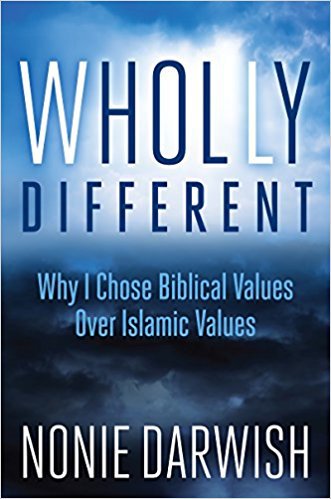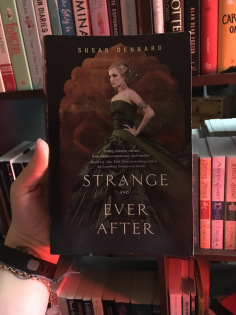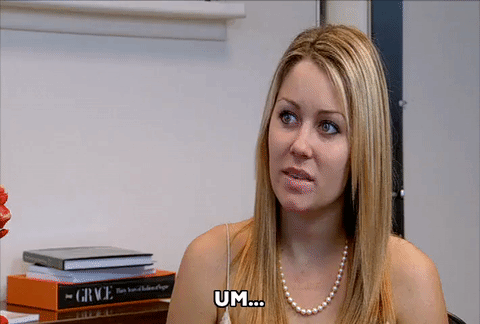 Religious Freedom Coalition, by Andrew Harrod, PhD., April 24, 2017:
Religious Freedom Coalition, by Andrew Harrod, PhD., April 24, 2017:
“Islamic values will take any society to Hell,” bluntly concludes Egyptian-American Muslim convert to Christianity Nonie Darwish in her recent book Wholly Different: Why I Chose Biblical Values over Islamic Values. With her usual engaging style, she critiques on the basis of personal experience crucial differences between Islamic and Biblical worldviews while analyzing Islam’s dangers for Judeo-Christian influenced civilization.
Comparing her 30 years in Egypt with her life after immigrating to the United States in 1978, Darwish notes recent efforts to replace the term “Judeo-Christian” with “Abrahamic. In particular, “Muslims in the West are desperately trying to convince everyone here that Islam, Judaism, and Christianity are all basically one and the same Abrahamic faith,” an “intentional lie, the opposite of everything preached in mosques.” Rather, “Islam was created six hundred years after Christianity not to affirm the Bible, but to discredit it; not to co-exist with ‘the people of the book’—Jews and Christians—but to replace them.” For various practical desires, Islam’s prophet Muhammad created a “new, specifically Arab religion” and “built Islam on a foundation of lies,” including the Quran’s “abomination.”
Darwish sharply contrasts decidedly distinct Biblical and Islamic understandings of God. “Muslims relate to Allah, as a far and distant God, angry, vengeful, and eager to punish.” By contrast, “[w]hen I became Christian and heard for the first time that we human beings were made in the image of God, I wept. I was in awe at the honor, after being given shame and little value under Islam.”
“It is unfortunate that many Americans take Biblical values for granted, assuming that kindness, honesty, and joy are the norm,” Darwish warns, whereas reality belies multicultural illusions of global moral uniformity. “Biblical values are the product of the Bible, and they cannot be preserved separate from the Bible” even as “[m]any Americans today fear that Biblical values are eroding, and I share their fears.” Especially the Golden Rule “is totally alien to Islam. Nothing like love and tolerance to other human beings just because they are human exists in Islam.”
Christian refugee mothers desperately need diapers for their babies – Please help
Darwish writes that Islam “claims to be a religion, but is really a totalitarian political ideology.” Furthermore, “[b]y making jihad the single most sacred act of worship, Muhammad made Islam an expansionist genocidal ideology.” Islam’s canons, the
Koran and hadith collections are predominantly books about rejecting the other—other religions, cultures, and ways of life. Islamic supremacy is taught on every page of the Koran, where Muslims are commanded never to stop until Islam dominates and destroys all other religions.
“Life under sharia is traumatic,” Darwish recalls from her personal experience as an Islamic insider in Egypt. “Oppression permeates every level of Islamic society; from the head of state to the street sweeper.” Accordingly, “I have no childhood memories of being happy or being around happy people.”
Among other harms to domestic tranquility, Darwish writes that the “disparity between men’s and women’s sexual lives under Islam is obscene and offensive.” “Islamic laws promote the sadistic repression of women” such that a “Muslim little boy is brought up to regard women who are not covered as sluts who are asking for it.” By contrast, a “Muslim man, married or unmarried, who understands all the games and loopholes that sharia allows to men will have no problem having sex as often as he wishes.” Muhammad additionally proclaimed an “obscenely lustful Islamic Paradise” as an otherworldly “lure to recruit jihadists.”
Darwish’s contrast between Biblical and Islamic family values is correspondingly clear:
While the Bible fosters loving, happy family life grounded in the mutual fidelity between one man and one woman, Islam demands faithfulness only from the woman—on pain of death—and fosters family strife, with up to four wives (plus sex slaves) competing for the man’s attention.
Darwish attributes other distortions of the human spirit to Islam; for example, she was “amazed at the lack of initiative and drive in the Muslim population.” Yet given Islam’s approval of plunder seized in jihad, “why would a Muslim man who is continually hammered with the values of jihad be interested in positive hard work for the betterment of society.” “Islam deprives Muslims of so much” in other ways; “I now look at my dog and wonder how did I live half my life in Egypt without ever experiencing this unique special relationship between a human being and a dog.”
Darwish’s personal experience makes her amazed that “Western policies in the Middle East are based on the hypothesis that Muslims are just like everybody else and want the same things in life.” “The slogan ‘Islam is a religion of peace’ was specifically created for Western consumption—I never heard that expression in all my decades living in the Middle East.” “[T]here are moderate Muslims, but there are no moderate Islamic scriptures to support what they claim,” rather, these Muslim are “importing Biblical values to Islam.”
Darwish’s answer to Islam emphasizes that the “number one enemy of Islam is the truth. And that has made the Bible itself the biggest threat to Islam.” “The reason freedom of religion is banned under Islam and by Islamic states is that Islam has no confidence it would survive in free competition with Christianity.” “Muslims’ typical response to questioning of Islam has always been to be offended, get angry, issue death fatwas, riot, and commit acts of terror.” Such dangers mean that the “happy Muslim is the Muslim who is content not to want to know” about objections to his faith. Meanwhile, per doctrines like taqiyya, “[d]eception in defense of Islam and its goals is big business for Islamic organizations and lobbying groups in the West.”
Darwish’s Christian convert zeal against Islam will surely shock many, but her book unflinchingly welcomes debate. “My fear of Islam is not a phobia. I am afraid for good reason.” Her powerful personal testimony will challenge opponents; “I am evolving from a morally confused woman under Islamic enslavement into the kind of woman God intended me to be.”
Andrew E. Harrod is a researcher and writer who holds a PhD from the Fletcher School of Law and Diplomacy and a JD from George Washington University Law School. He is a fellow with the Lawfare Project, an organization combating the misuse of human rights law against Western societies. He can be followed on twitter at @AEHarrod. Share this:




